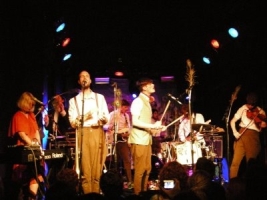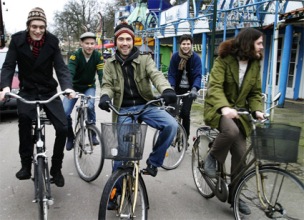 |
|
|
|
Interview with Efterklang
|
Ο Χάρης Αποστολόπολος συνομίλησε με τον Thomas Kirirath Husmer (ντραμς, τρομπέτα), ο οποίος έκανε αρκετό κόπο να σκεφτεί με ειλικρίνεια τι θα απαντήσει, χαρίζοντάς μας μια σπουδαία συνέντευξη.
review of theri live show in Greece
Q:Q. How would you describe your music in a town of flames and acts of violence (like the night of 06/12 in Athens)?
A: It was a strange experience that night. Just a couple of hours before the riot we went out for dinner, and everything seemed peaceful and fine. Then just as we were about to go on stage we were told that the police had shot a young boy, and that there was a riot in the neighborhood. That of course affected us. It felt surreal to play a joyful show while people were fighting outside. In a way we felt it was more important than ever to be happy and just play. Q. In which way has your country affected your inspiration?
A: Denmark is a very materialistic society. In our part of the world materialistic growth is valued higher than mental growth. I’ve never understood why it has to be like that, but I’ve decided long ago, to live my life differently, and first of all I try to pursue personal mental growth. And in my opinion music is the perfect occupation for one who doesn’t seek materialistic wealth :)
Q. If "efter" stands for "after", then "klang" stands for. What is really left "efter" the "klang" then?
A: The word "efterklang" is the Danish word for ’reverberation’ or ’echo’. In a wider sence, the word can also mean ’remembrance’. You know, certain things from the past still echoes in the future, and certain actions in the presence might echo, or leave an efterklang, in the future..
 Q:Q. If your music targets somewhere, would this be the kindness and "beauty" of human kind? Q:Q. If your music targets somewhere, would this be the kindness and "beauty" of human kind?
A: I’m flattered by your point of view in this question, because you hint that our music is beautiful. Thanks :) But honestly we don’t target our music at anything particular. We simply try to create the music so that it fits with our own conception of music - so that the music sounds, as we would like it to. Our intention is to let the music be on its own premises. The listener will interpret the music according to his or her own state of mind. For the same reason our lyrics don’t carry any specific massages either.
Q:Q. Is music moving in circles nowadays, recycling elements of the past, or there is space, still left to explore?
A: That is part of the beauty, that music is recyclable! Many of the contemporary artists have surely studied the music from the past, and often it’s clearly that elements are being borrowed or recycled. But that is not really important. The interesting thing is, that music, recycled or not, continues to mirror the minds of the creators. And as long as there are curious souls, there is space to explore! Also if space has been explored already..
Q: In which way you would describe evolution in your music?
A: Our music in the past was probably more introvert and in a way more dark than our music today. Perhaps we were all very serious then. We are af course still serious about the music, but I think we, during the last years of touring, have discovered that playing music can be very fun and joyful. And that joyfulness is probably present in the music we have been making lately.
Q. Can human awareness arouse through music or art in general? 
A: I strongly believe that art and music has the power to awaken a higher spiritual awareness. I believe that art has the ability to bypass the intellectual mind. It can communicate to you through some cosmic language directly to your heart.
Q:Q. If you consider your music as a bus that makes continuous stops to take passengers with different characteristics like melancholy, peacefulness etc. what else would you expect, or like, to take with you?
A: Ultimately I think we’d like to be able to carry them all. But its not that we would pick one emotion out and forcefully put it in the music. It’s rather that music is an important part of our everyday life, and that the music we create reflects our general emotional states.
Χάρης Αποστολόπουλος |
